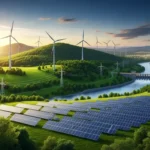Energy efficiency stands as a cornerstone in the pursuit of sustainable and responsible resource utilization. This detailed analysis delves into the significance of energy efficiency, its impact on the environment, economic benefits, technological innovations, and the pivotal role it plays in shaping a more sustainable future.
Significance of Energy Efficiency
Energy efficiency holds immense significance due to several key factors:
- Environmental Impact: Efficient energy use reduces the demand for fossil fuels, mitigating environmental degradation and lowering greenhouse gas emissions.
- Economic Benefits: Improving energy efficiency translates into cost savings for individuals, businesses, and governments, fostering economic growth and resilience.
- Resource Conservation: It helps conserve finite resources, ensuring their availability for future generations and reducing the overall ecological footprint.
Environmental Impact of Energy Efficiency
The impact of energy efficiency on the environment is substantial:
- Reduced Carbon Footprint: Energy-efficient technologies and practices contribute to the reduction of carbon emissions, combating climate change.
- Preservation of Ecosystems: Lower energy consumption reduces the need for resource extraction, preserving ecosystems and biodiversity.
- Air and Water Quality Improvement: Reduced reliance on polluting energy sources improves air and water quality, promoting human and environmental health.
Economic Benefits of Energy Efficiency
The economic advantages of energy efficiency are diverse and impactful:
- Cost Savings: Businesses and individuals benefit from lower energy bills, leading to increased disposable income and improved competitiveness.
- Job Creation: The energy efficiency sector fosters job creation through the development, installation, and maintenance of energy-efficient technologies.
- Economic Resilience: Countries with robust energy efficiency strategies are better equipped to withstand energy price fluctuations and supply disruptions.
Technological Innovations Driving Energy Efficiency
Innovations play a crucial role in advancing energy efficiency:
- Smart Technologies: The integration of smart technologies, such as smart meters and home automation, optimizes energy use by providing real-time data and control.
- Renewable Energy Integration: The synergy between energy efficiency measures and renewable energy sources enhances overall sustainability.
- Energy Storage Solutions: Advanced energy storage technologies enable the efficient utilization of energy generated from intermittent sources like solar and wind.
Challenges in Achieving Energy Efficiency
Despite its benefits, achieving energy efficiency faces certain challenges:
- Initial Costs: The upfront costs of energy-efficient technologies may pose a barrier, requiring incentives and policies to encourage adoption.
- Behavioral Patterns: Changing ingrained behaviors and practices related to energy use can be challenging, requiring effective public awareness campaigns.
- Policy and Regulatory Frameworks: Inconsistent or inadequate policies and regulations may hinder the widespread implementation of energy efficiency measures.
Strategies for Promoting Energy Efficiency
Promoting energy efficiency necessitates a multi-faceted approach:
- Incentive Programs: Governments can implement financial incentives, tax credits, and rebates to encourage individuals and businesses to invest in energy-efficient technologies.
- Education and Outreach: Raising awareness about the benefits of energy efficiency through educational programs and outreach initiatives.
- Strategic Planning: Governments and businesses should integrate energy efficiency into long-term planning, considering it a central component of sustainable development.
The Future of Energy Efficiency
The future of energy efficiency holds promising developments:
- Innovation Acceleration: Ongoing research and development will continue to yield innovative solutions, making energy-efficient technologies more accessible and effective.
- International Collaboration: Global cooperation is essential to address energy challenges collectively and implement universally effective energy efficiency strategies.
- Policy Evolution: Continued refinement and strengthening of energy efficiency policies and regulations to adapt to evolving technologies and global energy needs.
Conclusion
Energy efficiency is not merely a concept; it is a fundamental principle guiding our journey toward a sustainable and resilient future. As we navigate the challenges posed by growing energy demands and environmental concerns, prioritizing and investing in energy efficiency becomes imperative. Through technological advancements, strategic policies, and collective efforts, we have the potential to create a world where energy is used wisely, ensuring a harmonious balance between human activities and the preservation of our planet for generations to come.





